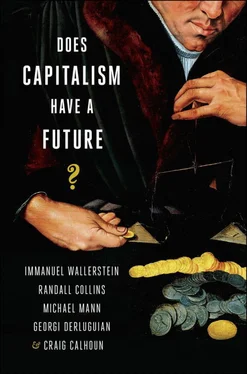Immanuel Wallerstein - Does Capitalism Have a Future?
Здесь есть возможность читать онлайн «Immanuel Wallerstein - Does Capitalism Have a Future?» весь текст электронной книги совершенно бесплатно (целиком полную версию без сокращений). В некоторых случаях можно слушать аудио, скачать через торрент в формате fb2 и присутствует краткое содержание. Город: New York, Год выпуска: 2013, ISBN: 2013, Издательство: Oxford University Press, Жанр: Публицистика, sci_economy, на английском языке. Описание произведения, (предисловие) а так же отзывы посетителей доступны на портале библиотеки ЛибКат.
- Название:Does Capitalism Have a Future?
- Автор:
- Издательство:Oxford University Press
- Жанр:
- Год:2013
- Город:New York
- ISBN:978-0-19-933084-3
- Рейтинг книги:5 / 5. Голосов: 1
-
Избранное:Добавить в избранное
- Отзывы:
-
Ваша оценка:
- 100
- 1
- 2
- 3
- 4
- 5
Does Capitalism Have a Future?: краткое содержание, описание и аннотация
Предлагаем к чтению аннотацию, описание, краткое содержание или предисловие (зависит от того, что написал сам автор книги «Does Capitalism Have a Future?»). Если вы не нашли необходимую информацию о книге — напишите в комментариях, мы постараемся отыскать её.
Does Capitalism Have a Future? — читать онлайн бесплатно полную книгу (весь текст) целиком
Ниже представлен текст книги, разбитый по страницам. Система сохранения места последней прочитанной страницы, позволяет с удобством читать онлайн бесплатно книгу «Does Capitalism Have a Future?», без необходимости каждый раз заново искать на чём Вы остановились. Поставьте закладку, и сможете в любой момент перейти на страницу, на которой закончили чтение.
Интервал:
Закладка:
Technological displacement is the mechanism by which innovations in equipment and organization save labor, thereby enabling fewer employed persons to produce more at lower cost. Marx and Engels argued that capitalists strive to increase profit in competition with each other; those who fail to do so are driven out of the market. But as labor-saving machinery replaces workers, unemployment grows and consumer demand falls. Technology promises abundance, but the potential product cannot be sold because too few persons have enough income to buy it. Extrapolating this underlying structural tendency, Marx and Engels predicted the downfall of capitalism and its replacement by socialism.
Why has this not happened in the 160 years since the theory was formulated? As is well known, where socialist regimes have come into power, the transition was not driven by capitalist economic crisis—nor indeed when they have fallen out of power. My point here is the absence of definitive capitalist breakdown through technological displacement. Marx and Engels focused on the displacement of working-class labor; they did not foresee the rise of the massive middle class of white-collar employees, of administrative and clerical workers and educated professionals. But this is why I now argue for the return of technological displacement crisis. Until the 1980s or 1990s, mechanization chiefly displaced manual labor. In the most recent wave of technology, we now have the displacement of administrative labor, the downsizing of the middle class. Information technology is the technology of communications, and it has launched the second great era of contraction of work, the displacement of communicative labor, which is what middle-class employees do. Mechanization is now joined by robotization and electronicization—an ugly and ungainly term to add to our vocabulary of ugly terms dictating our long-term future.
As the working class shrunk through mechanization, capitalism was saved by the rise of the middle class. Now computerization, the Internet, and the wave of new micro-electronic devices are beginning to squeeze out the middle class. Can capitalism survive this second wave of technological displacement?
In the past, capitalism has escaped from technological displacement crises by five main escape routes. I will argue that all five of these now are becoming blocked—dead ends.
ESCAPE NUMBER 1: NEW TECHNOLOGY CREATES NEW JOBS AND ENTIRE NEW JOB SECTORS
Pessimism about new technology has long been considered futile and wrongheaded. The Luddites in 1811 who broke machines that destroyed the jobs of handicraft workers did not see that their system of production was giving way to a factory system which would vastly expand industries and increase, for over a century, the numbers of factory workers. Development theory, formulated in the mid-20th century, held that the natural tendency is to move through the stages of primary, secondary, and tertiary labor sectors (i.e., extractive, manufacturing, and administrative or service work). But development theory was just an empirical generalization from a particular time in history; there is no guarantee that this process will go on forever. Agricultural labor went from a large majority of all jobs to about 1% in today’s advanced economies; manufacturing went from a height of some 40% to 15% or less. These figures show the magnitude of what technological displacement can do. A similar reduction in the administrative/service sector is plausible.
Schumpeter, the best theorist of capitalist innovation, theorizes that new products—and hence the major sources of profit—come on the market by reorganizing the factors of production into new combinations; this always involves what Schumpeter called “creative destruction.” Nevertheless, Schumpeter-inspired economists also rely on nothing more than extrapolation of past trends for the argument that the number of jobs created by new products will make up for the jobs lost by destruction of old markets.
None of these theories take account of the technological displacement of communicative labor, the escape valve that in the past has brought new employment to compensate for the loss of old employment. It has been argued that as telephone operators and file clerks lose their jobs to automated and computerized systems, an equal number acquire jobs as software developers, computer technicians, and mobile phone salespersons. But no one has shown any good theoretical reason why these numbers should be equal; much less why the automation of these kinds of technical and communicative tasks—for instance by shopping online—cannot drive down the size of the white-collar labor force. Technological displacement is ongoing as we speak. Within the past few years, checkout clerks in stores have been replaced by automated self-serve checkouts, cutting into one of the largest areas of lower-middle class service sector employment. At a higher skill level, professional journalists are being displaced by the downsizing or disappearance of newspapers, driven by competition from online news, itself deriving from a small number of paid journalists and a large number of amateur, unpaid bloggers.
Computerization of the middle class is not being compensated by the creation of new jobs at an equal rate. New jobs are created, but they do not match the number of jobs eliminated, nor do they replace lost income. This is a reason why job-retraining programs for displaced workers have failed to affect the rate of structural unemployment. Computerization and the Internet have generated new sectors of work: software design, website construction, numerous work-from-home online informational and consulting services. These latter tend to be low paying, not surprising given easy access by a growing number of competitors, many of whom provide their offerings for free. Although Information Technology (IT) generates new activities, it does not generate paying jobs at the same rate that it eliminates them. The proliferation of opinion blogs does not make up for the elimination of paid occupations in journalism.
Focusing solely on the paid employment generated by IT as compared to the jobs displaced by IT, and extrapolating trends over a period of decades, is it plausible that 70% or more of world employment will be computer programmers and designers of software and computer applications? Bear in mind that computerization is still in its youth, past its infancy but not yet into maturity. The metaphor is overly biological, but the point is that more sophisticated computation is still to come: Artificial Intelligence, in which machines take over higher cognitive processes from humans. When computer programming itself is done entirely by computers, as well as the creation of new applications, the displacement of middle-class labor will be nearly complete. Jobs for computer programmers will no longer be an escape route. It never has been an equalizer compensating for the numbers of jobs lost; and over time, the amount of job creation for humans compared to work taken over by computers will be a steadily decreasing slice—a channel whose walls grow steadily narrower.
In an advanced economy such as the United States, jobs in the service sector have grown to about 75% of the labor force, a result of the decline in industrial and agricultural/extractive occupations (Autor and Dorn 2013). But the service sector is becoming squeezed by the IT economy, itself little more than twenty-five years old. Sales jobs are rapidly becoming automated by computer-generated messaging and by online buying; in brick-and-mortar stores, retail clerks are being replaced by electronic scanners. Management positions too will come under increasing pressure as artificial intelligence grows.
There is no intrinsic end to this process of replacing human with computers and other machines. The displacement of human work will go on, not just for the next twenty years but the next hundred, even the next thousand years—unless something extrinsic happens to change the underlying mechanism driving technological displacement of work: capitalist competition.
Читать дальшеИнтервал:
Закладка:
Похожие книги на «Does Capitalism Have a Future?»
Представляем Вашему вниманию похожие книги на «Does Capitalism Have a Future?» списком для выбора. Мы отобрали схожую по названию и смыслу литературу в надежде предоставить читателям больше вариантов отыскать новые, интересные, ещё непрочитанные произведения.
Обсуждение, отзывы о книге «Does Capitalism Have a Future?» и просто собственные мнения читателей. Оставьте ваши комментарии, напишите, что Вы думаете о произведении, его смысле или главных героях. Укажите что конкретно понравилось, а что нет, и почему Вы так считаете.












